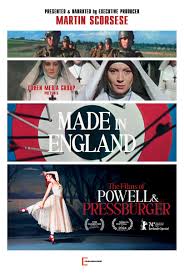Displaying items by tag: Made in England: the Films of Michael Powell and Emeric Pressburger movie
Made in England: The Films of Michael Powell and Emeric Pressburger

MADE IN ENGLAND: THE FILMS OF POWELL AND PRESSBURGER
UK/US, 2024, 132 minutes, Colour.
Martin Scorsese.
Directed by David Hinton.
This is a filmed masterclass with Martin Scorsese, talking to camera, but speaking earnestly and always interestingly to the cinema audience.
From his childhood, seeing The Red Shoes, he has been enthusiastic for the films of Michael Powell and Emeric Pressburger. In his early years of making films, he corresponded with Michael Powell. And, Powell, in his retirement, moved to Los Angeles, a strong friendship with Scorsese over many years. Scorsese had studied with Thelma Schoenmaker who married Powell and who has been the editor of Scorsese’s films for over 40 years.
This is the background for Scorsese’s enthusiasm.
Scorsese makes his audience comfortable with scenes from the films, with photos and clips of the two directors, an enjoyable introduction and he moves to a biography of Powell, very British in his way. Then a biography of Pressburger, born in Hungary, working in Germany, then in France and moving to England, learning the language, becoming a master of the language.
There is an overview of Powell’s early career, working in studios in Nice in the 1930s with American director, the imaginative Rex Ingram. Then a number of small features in England. His first major film was set in Scotland, Edge of the World. And, as with all the films that follow, extensive clips from the films and analysis by Scorsese himself, of technique and style, of themes, of issues, artistic, political…
The first collaboration between Powell and Pressburger was in 1939, the year of the outbreak of World War II, a spy film, The Spy in Black. During the 40s, they had an extraordinary career. Pressburger was the writer, coproducing with Powell as director. There were not only friends, but there was of professional love and friendship between them, never an ill word against each other, even when there was a parting of the ways in the late 1950s. There are many interviews with each of the throughout the film and quite a number of interviews, judging by their ages, and appearance, over several decades. And, finally an award, presented by Deborah Kerr, star of two of the most significant films.
World War II provided a strong occasion for their filmmaking and insights, beginning with The 49th Parallel, Nazi soldiers stranded in Canada, going to the German community, rejected by them. Then there was the film, disliked by Churchill, the Life and Death of Colonel Blimp, an overview of Britain at war in three stories, from the early 20th century, World War I, World War II, featuring Roger Livesy in the central role and introducing Deborah Carr in three roles, filmed when she was in her early 20s. Something of a sardonic look at changing British military attitudes and behaviour.
This was followed by a black-and-white production, A Canterbury Tale, Chaucer’s framework, again World War II. And, fostering relationship with the United States, the extraordinary fantasy, in black and white for Heaven, in colour for Earth, A Matter of Life and Death.
With the end of the war there was the light touch with the romance, I Know Where I’m Going. But a key film in this post war period, set in India but filmed in England with back drops and sets, Black Narcissus, a story of Anglican nuns from a novel by Rumer Goden. Exotic, intriguing, colourful, highly imaginative. This was followed by The Red Shoes, ballerina, Moira Shearer, persuaded to dance and at the central role, the Hans Anderson fable, the dancer, her controller – featuring Anton Walbrook, in so many of Powell and Pressburger films, and a tour de force by Australia’s Robert Helpmann.
The film traces the couples dealing with the Rank Studios, with Alexander Korda, the very small budget The Small Back Room, commercial failure in his time but interesting in retrospect. Then attempted collaboration with Sam Goldwyn, the reworking of the Scarlet Pimpernel, The Elusive Pimpernel and with David Selznick for his wife, Jennifer Jones, Gone to Earth, which was recut by Selznick and released as Wild Heart.
The 50s were difficult for the couple, the American influence, the budget for a dramatisation in dance of Tales of Hoffman, the musical of Offenbach, highly imaginative – then also cut but restored in later decades. A follow-up was Oh.. Rosalinda, based on the Strauss light operetta, Die Fledermaus, The Bat, N acquired taste for most audiences, THE popular audience put off by the music, the singing, the farcical story, the highly stylised performances. One of the reasons for seeing it is the British cast, especially Michael Redgrave singing, dancing, high kicks and leaping click of heels, a performance unlike any of his others.
Some war films in the mid-1950s, The Battle of the River Plate and Ill Met by Moonlight.
The climax of Powell’s career was the psychological/horror drama of 1960, Peeping Tom, mostly condemned by many reviewers on release, calls for it to be banned. However, again appreciated in retrospect.
Scorsese omits some of the lighter comedies and dramas Powell made from 1959 to the mid-60s, as well as some television episodes. The main feature film that Scorsese does not comment on is another of their World War II drama is, from 1942, One of Our Aircraft is missing. No explanation why comment on this film is missing.
His final work, in the second half of the 1960s, was in Australia, some clips shown from his Age of Consent, 1968. And, for Australian audience, the disappointment of a mere reference without its being named, Powell’s comedy, the archetypal “New Australian” book and comedy, They’re a Weird Mob.
Powell went to Hollywood, married, wrote his autobiography, kept in contact with Scorsese and the studios.
In fact, a master Masterclass.